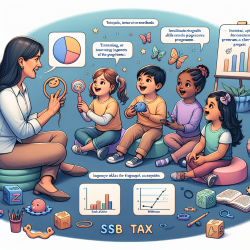Introduction
The field of speech-language pathology (SLP) is continually evolving, driven by research and innovative practices. While it might seem unrelated, the recent research article titled Towards the sustainable discovery and development of new antibiotics offers insights that can enhance SLP practice, particularly in making data-driven decisions and fostering interdisciplinary collaboration.
Data-Driven Decisions in SLP
In the research article, the authors emphasize the importance of using data to drive decisions in antibiotic discovery. This approach is equally crucial in SLP, where evidence-based practice is the cornerstone of effective therapy. By collecting and analyzing data on therapy outcomes, SLP practitioners can tailor interventions to meet the specific needs of children, ensuring that each session is as effective as possible.
Interdisciplinary Collaboration
The research highlights the need for collaboration between academic, industrial, and political stakeholders to tackle complex problems like antibiotic resistance. Similarly, SLP practitioners can benefit from interdisciplinary collaboration. Working alongside educators, healthcare providers, and families can provide a more comprehensive approach to therapy, addressing not just speech and language issues but also related cognitive and social aspects.
Innovation and Adaptability
One of the key takeaways from the antibiotic discovery research is the need for innovative solutions and adaptability. In SLP, this translates to adopting new technologies and methodologies, such as online therapy platforms like TinyEYE, which provide accessible and flexible therapy options for children. Embracing these innovations can help practitioners reach more children and provide consistent therapy, regardless of geographical barriers.
Encouraging Further Research
The research article calls for ongoing research and development to address antibiotic resistance. For SLP practitioners, this underscores the importance of staying informed about the latest research in the field. Engaging in continuous professional development and contributing to research can enhance the quality of therapy provided and lead to better outcomes for children.
Conclusion
While the challenges of antibiotic resistance and speech-language pathology may differ, the principles of data-driven decisions, collaboration, innovation, and ongoing research are universally applicable. By integrating these principles into SLP practice, practitioners can improve therapy outcomes and contribute to the overall well-being of children.
To read the original research paper, please follow this link: Towards the sustainable discovery and development of new antibiotics.










